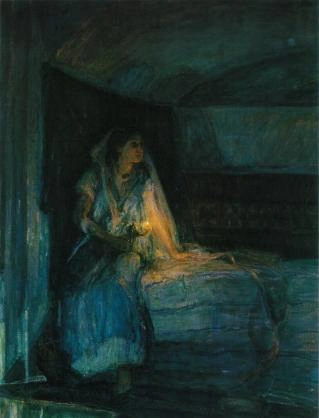1
Zmija bijaše lukavija od sve zvjeradi što je stvori Jahve, Bog. Ona reče ženi: "Zar vam je Bog rekao da ne smijete jesti ni s jednog drveta u vrtu?"
2
Žena odgovori zmiji: "Plodove sa stabala u vrtu smijemo jesti.
3
Samo za plod stabla što je nasred vrta rekao je Bog: 'Da ga niste jeli! I ne dirajte u nj, da ne umrete!'"
4
Nato će zmija ženi: "Ne, nećete umrijeti!
5
Nego, zna Bog: onog dana kad budete s njega jeli, otvorit će vam se oči, i vi ćete biti kao bogovi koji razlučuju dobro i zlo."
6
Vidje žena da je stablo dobro za jelo, za oči zamamljivo, a za mudrost poželjno: ubere ploda njegova i pojede. Dade i svom mužu, koji bijaše s njom, pa je i on jeo.
7
Tada se obadvoma otvore oči i upoznaju da su goli. Spletu smokova lišća i naprave sebi pregače.
8
Uto čuju korak Jahve, Boga, koji je šetao vrtom za dnevnog povjetarca. I sakriju se - čovjek i njegova žena - pred Jahvom, Bogom, među stabla u vrtu.
9
Jahve, Bog, zovne čovjeka: "Gdje si?" - reče mu.
10
On odgovori: "Čuo sam tvoj korak po vrtu; pobojah se jer sam go, pa se sakrih."
11
Nato mu reče: "Tko ti kaza da si go? Ti si, dakle, jeo sa stabla s kojega sam ti zabranio jesti?"
12
Čovjek odgovori: "Žena koju si stavio uza me - ona mi je dala sa stabla pa sam jeo."
13
Jahve, Bog, reče ženi: "Što si to učinila?" "Zmija me prevarila pa sam jela", odgovori žena.
14
Nato Jahve, Bog, reče zmiji: "Kad si to učinila, prokleta bila među svim životinjama i svom zvjeradi divljom! Po trbuhu svome puzat ćeš i zemlju jesti sveg života svog!
15
Neprijateljstvo ja zamećem između tebe i žene, između roda tvojeg i roda njezina: on će ti glavu satirati, a ti ćeš mu vrebati petu."
16
A ženi reče: "Trudnoći tvojoj muke ću umnožit, u mukama djecu ćeš rađati. Žudnja će te mužu tjerati, a on će gospodariti nad tobom."
17
A čovjeku reče: "Jer si poslušao glas svoje žene te jeo sa stabla s kojega sam ti zabranio jesti rekavši: S njega da nisi jeo! - evo: Zemlja neka je zbog tebe prokleta: s trudom ćeš se od nje hraniti svega vijeka svog!
18
Rađat će ti trnjem i korovom, a hranit ćeš se poljskim raslinjem.
19
U znoju lica svoga kruh svoj ćeš jesti dokle se u zemlju ne vratiš: tÓa iz zemlje uzet si bio - prah si, u prah ćeš se i vratiti."
20
Svojoj ženi čovjek nadjene ime Eva, jer je majka svima živima.
21
I načini Jahve, Bog, čovjeku i njegovoj ženi odjeću od krzna pa ih odjenu.
22
Zatim reče Bog: "Evo, čovjek postade kao jedan od nas - znajući dobro i zlo! Da ne bi sada pružio ruku, ubrao sa stabla života pa pojeo i živio navijeke!"
23
Zato ga Jahve, Bog, istjera iz vrta edenskoga da obrađuje zemlju iz koje je i uzet.
24
Istjera, dakle, čovjeka i nastani ga istočno od vrta edenskog, pa postavi kerubine i plameni mač koji se svjetlucao - da straže nad stazom koja vodi k stablu života.







